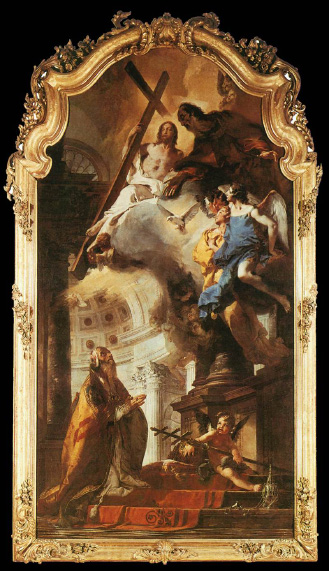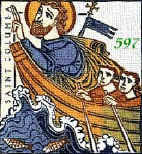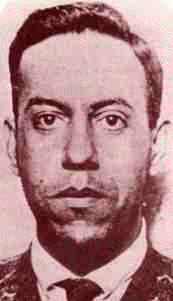Collect:
O God, who in Saint Columban
wonderfully joined the work of evangelization
to zeal for the monastic life,
grant, we pray,
that through his intercession and example
we may strive to seek you above all things
and to bring increase to your faithful people.
Through our Lord Jesus Christ, your Son,
who lives and reigns with you in the unity of the Holy Spirit,
one God, for ever and ever. +Amen.
First Reading: Isaiah 52:7-10
How beautiful upon the mountains are the feet of him who brings good tidings, who publishes peace, who brings good tidings of good, who publishes salvation, who says to Zion, "Your God reigns."Hark, your watchmen lift up their voice, together they sing for joy; for eye to eye they see the return of the LORD to Zion. Break forth together into singing, you waste places of Jerusalem; for the LORD has comforted his people, he has redeemed Jerusalem. The LORD has bared his holy arm before the eyes of all the nations; and all the ends of the earth shall see the salvation of our God.
Gospel Reading: Luke 9:57-62
As they were going along the road, a man said to Him, "I will follow you wherever you go." And Jesus said to Him, "Foxes have holes, and birds of the air have nests; but the Son of man has nowhere to lay His head." To another He said, "Follow Me." But he said, "Lord, let me first go and bury my father." But Jesus said to him, "Leave the dead to bury their own dead; but as for you, go and proclaim the kingdom of God." Another said, "I will follow you, Lord; but let me first say farewell to those at my home." Jesus said to him, "No one who puts his hand to the plow and looks back is fit for the kingdom of God."
BENEDICT XVI, GENERAL AUDIENCE, Wednesday, 11 June 2008
Saint Columban
Dear Brothers and Sisters,
Today I would like to speak about the holy Abbot Columban, the best known Irishman of the early Middle Ages. Since he worked as a monk, missionary and writer in various countries of Western Europe with good reason he can be called a "European" Saint. With the Irish of his time, he had a sense of Europe's cultural unity. The expression "totius Europae - of all Europe", with reference to the Church's presence on the Continent, is found for the first time in one of his letters, written around the year 600, addressed to Pope Gregory the Great (cf. Epistula I, 1).
Columban was born c. 543 in the Province of Leinster in southeast Ireland. He was educated at home by excellent tutors who introduced him to the study of liberal arts. He was then entrusted to the guidance of Abbot Sinell of the community of Cleenish in Northern Ireland, where he was able to deepen his study of Sacred Scripture. At the age of about 20 he entered the monastery of Bangor, in the northeast of the island, whose abbot, Comgall, was a monk well known for his virtue and ascetic rigour. In full agreement with his abbot, Columban zealously practiced the severe discipline of the monastery, leading a life of prayer, ascesis and study. While there, he was also ordained a priest. His life at Bangor and the Abbot's example influenced the conception of monasticism that developed in Columban over time and that he subsequently spread in the course of his life.
When he was approximately 50 years old, following the characteristically Irish ascetic ideal of the "peregrinatio pro Christo", namely, making oneself a pilgrim for the sake of Christ, Columban left his island with 12 companions to engage in missionary work on the European Continent. We should in fact bear in mind that the migration of people from the North and the East had caused whole areas, previously Christianized, to revert to paganism. Around the year 590, the small group of missionaries landed on the Breton coast. Welcomed kindly by the King of the Franks of Austrasia (present-day France), they asked only for a small piece of uncultivated land. They were given the ancient Roman fortress of Annegray, totally ruined and abandoned and covered by forest. Accustomed to a life of extreme hardship, in the span of a few months the monks managed to build the first hermitage on the ruins. Thus their re-evangelization began, in the first place, through the witness of their lives. With the new cultivation of the land, they also began a new cultivation of souls. The fame of those foreign religious who, living on prayer and in great austerity, built houses and worked the land spread rapidly, attracting pilgrims and penitents. In particular, many young men asked to be accepted by the monastic community in order to live, like them, this exemplary life which was renewing the cultivation of the land and of souls. It was not long before the foundation of a second monastery was required. It was built a few kilometres away on the ruins of an ancient spa, Luxeuil. This monastery was to become the centre of the traditional Irish monastic and missionary outreach on the European Continent. A third monastery was erected at Fontaine, an hour's walk further north.
Columban lived at Luxeuil for almost 20 years. Here the Saint wrote for his followers the Regula monachorum - for a while more widespread in Europe than Benedict's Rule - which portrayed the ideal image of the monk. It is the only ancient Irish monastic rule in our possession today. Columban integrated it with the Regula coenobialis, a sort of penal code for the offences committed by monks, with punishments that are somewhat surprising to our modern sensibility and can only be explained by the mentality and environment of that time. With another famous work entitled: De poenitentiarum misura taxanda, also written at Luxeuil, Columban introduced Confession and private and frequent penance on the Continent. It was known as "tariffed" penance because of the proportion established between the gravity of the sin and the type of penance imposed by the confessor. These innovations roused the suspicion of local Bishops, a suspicion that became hostile when Columban had the courage to rebuke them openly for the practices of some of them. The controversy over the date of Easter was an opportunity to demonstrate their opposition: Ireland, in fact, followed the Eastern rather than the Roman tradition. The Irish monk was convoked in 603 to account to a Synod at Chalon-sur-Saône for his practices regarding penance and Easter. Instead of presenting himself before the Synod, he sent a letter in which he minimized the issue, inviting the Synod Fathers not only to discuss the problem of the date of Easter, in his opinion a negligible problem, "but also all the necessary canonical norms that - something more serious - are disregarded by many" (cf. Epistula II, 1). At the same time he wrote to Pope Boniface IV - just as several years earlier he had turned to Pope Gregory the Great (cf. Epistula I) - asking him to defend the Irish tradition (cf. Epistula III).
Intransigent as he was in every moral matter, Columban then came into conflict with the royal house for having harshly reprimanded King Theuderic for his adulterous relations. This created a whole network of personal, religious and political intrigues and manoeuvres which, in 610, culminated in a Decree of expulsion banishing Columban and all the monks of Irish origin from Luxeuil and condemning them to definitive exile. They were escorted to the sea and, at the expense of the court, boarded a ship bound for Ireland. However, not far from shore the ship ran aground and the captain, who saw this as a sign from Heaven, abandoned the voyage and, for fear of being cursed by God, brought the monks back to dry land. Instead of returning to Luxeuil, they decided to begin a new work of evangelization. Thus, they embarked on a Rhine boat and travelled up the river. After a first stop in Tuggen near Lake Zurich they went to the region of Bregenz, near Lake Constance, to evangelize the Alemanni.
However, soon afterwards, because of political events unfavourable to his work, Columban decided to cross the Alps with the majority of his disciples. Only one monk whose name was Gallus stayed behind; it was from his hermitage that the famous Abbey of St Gall in Switzerland subsequently developed. Having arrived in Italy, Columban met with a warm welcome at the Lombard Royal Court but was immediately faced with considerable difficulties: the life of the Church was torn apart by the Arian heresy, still prevalent among the Lombards, and by a schism which had detached most of the Church in Northern Italy from communion with the Bishop of Rome. Columban entered authoritatively into this context, writing a satirical pamphlet against Arianism and a letter to Boniface IV to convince him to take some decisive steps with a view to re-establishing unity (cf. Epistula V). When, in 612 or 613, the King of the Lombards allocated to him a plot of land in Bobbio, in the Trebbia Valley, Columban founded a new monastery there which was later to become a cultural centre on a par with the famous monastery of Monte Cassino. Here he came to the end of his days: he died on 23 November 615 and to this day is commemorated on this date in the Roman rite.
St Columban's message is concentrated in a firm appeal to conversion and detachment from earthly goods, with a view to the eternal inheritance. With his ascetic life and conduct free from compromises when he faced the corruption of the powerful, he is reminiscent of the severe figure of St John the Baptist. His austerity, however, was never an end in itself but merely the means with which to open himself freely to God's love and to correspond with his whole being to the gifts received from him, thereby restoring in himself the image of God, while at the same time cultivating the earth and renewing human society. I quote from his Instructiones: "If man makes a correct use of those faculties that God has conceded to his soul, he will be likened to God. Let us remember that we must restore to him all those gifts which he deposited in us when we were in our original condition. "He has taught us the way with his Commandments. The first of them tells us to love the Lord with all our heart, because he loved us first, from the beginning of time, even before we came into the light of this world" (cf. Instructiones XI). The Irish Saint truly incarnated these words in his own life. A man of great culture - he also wrote poetry in Latin and a grammar book - he proved rich in gifts of grace. He was a tireless builder of monasteries as well as an intransigent penitential preacher who spent every ounce of his energy on nurturing the Christian roots of Europe which was coming into existence. With his spiritual energy, with his faith, with his love for God and neighbour, he truly became one of the Fathers of Europe. He shows us even today the roots from which our Europe can be reborn.
© Copyright 2008 - Libreria Editrice Vaticana




